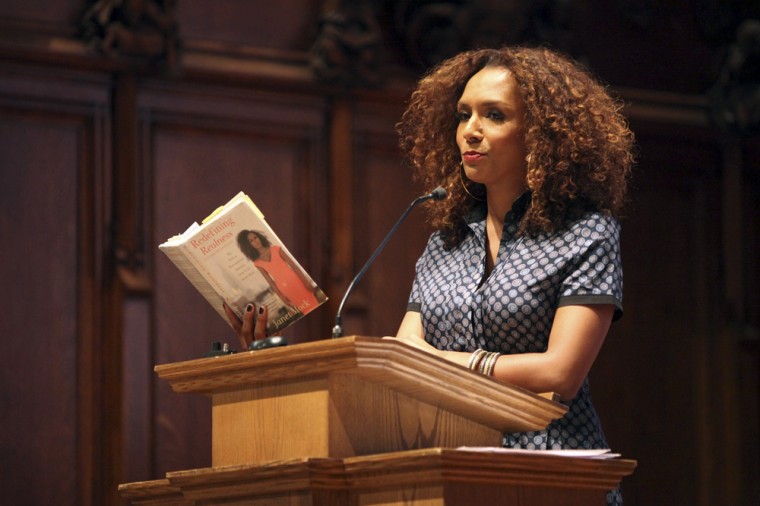Campus Events
Author Janet Mock talks activism, gender oppression, identity in Graham Chapel
Author, editor and activist Janet Mock spoke about her experiences as a mixed-race trans woman and her views on activism and intersectionality at the keynote address for Pride Alliance’s Trans* Awareness Week.
Pride Alliance social chair and senior Reuven Shechter estimated that Mock’s talk, which was co-sponsored by the Hawaii Club and the Association of Black Students, drew more than 450 students, faculty members and community members.
 Brian Benton | Student Life
Brian Benton | Student Life Author and activist Janet Mock speaks in Graham Chapel about her book “Redefining Realness: My Path to Womanhood, Identity, Love & So Much More.” Mock delivered the keynote address for Pride Alliance’s Trans* Awareness Week, bringing attention to issues of gender oppression and race.
Mock’s talk in Graham Chapel was part of Pride Alliance’s Trans* Awareness Week, which began on Monday. Mock follows Laverne Cox as the second consecutive high-profile keynote speaker for Trans* Awareness Week.
Mock began her talk by lauding the contributions of trans women in social justice movements for lesbian, bisexual, gay, transgender, queer, intersex and asexual communities and for people of color. Mock also urged people not to reduce others to a single identity and to embrace the intersection of different identities.
“We come in with gender, race, class, different abilities, different access points. For me personally, it’s necessary for me to be unapologetic about the multi-layered parts of myself,” Mock said.
During her talk, Mock read an excerpt from her memoir in which she describes the impact of pop culture, particularly Destiny’s Child’s song “Bills, Bill, Bills,” on her life as a young transgender girl.
“I was a mixed black girl in an American culture where trans women of color were not visible. I wasn’t represented in the media, but Beyonce and Destiny’s Child validated me,” Mock said. “She made me love being brown, love my adaptable hair, loved that my thighs touched.”
Junior Fabian Barch, Pride Alliance’s external co-president, hoped that bringing Mock to campus would expand students’ understanding of the trans* experience.
“We are hoping to spread awareness, educate people about the different difficulties that trans* people face and ways that you can help address those problems,” Barch said.
 Brian Benton | Student Life
Brian Benton | Student Life After her speech, Mock took questions from the audience. When asked about tensions between trans* activists and cisgender LGBTQIA activists, Mock suggested that cisgender activists remember the common goals of both movements, which she described as rooted in issues of gender.
“We prioritize sexual orientation over gender identity instead of what brought us all together, which was gender oppression,” Mock said. “If we would have stuck with the idea of gender being policed, that we are all oppressed by gender expectations, then the movement would be different.”
A St. Louis native who spoke during the Q-and-A session praised Mock for being a role model to her and other trans* people.
“You have been such an inspiration to me,” she said. “It’s really hard being trans and going to a military high school. I got through school and graduated because of you.”
Washington University students also thought that Mock’s speech was significant.
“Janet Mock is amazing,” senior Maxine Wright said. “I think having women of color at the forefront of the trans* movement is an important step for visibility of people of color LGBTQIA movements.”
 Brian Benton | Student Life
Brian Benton | Student Life Senior Henry Barry said he enjoyed the talk as well and appreciated the insight it provided into modern issues of gender identity.
“I really liked her message that oppression is something that can affect everyone, and that there is oppression in every category, whether it’s gender, race, sexual orientation, etc.,” Barry said. “I’m actually in Intro to Women and Gender Studies right now, and we just covered trans* issues last week, so it was really cool to see the current state of things because some of the articles we read are not as current.”
Other events in Trans* Awareness Week include a workshop on gender identity, a screening of the film “Transamerica,” and a vigil for transgender and non-binary individuals who have been victims of violence and discrimination.
Editor’s note: This article has been amended to reflect Janet Mock identifying herself specifically as a trans woman.
